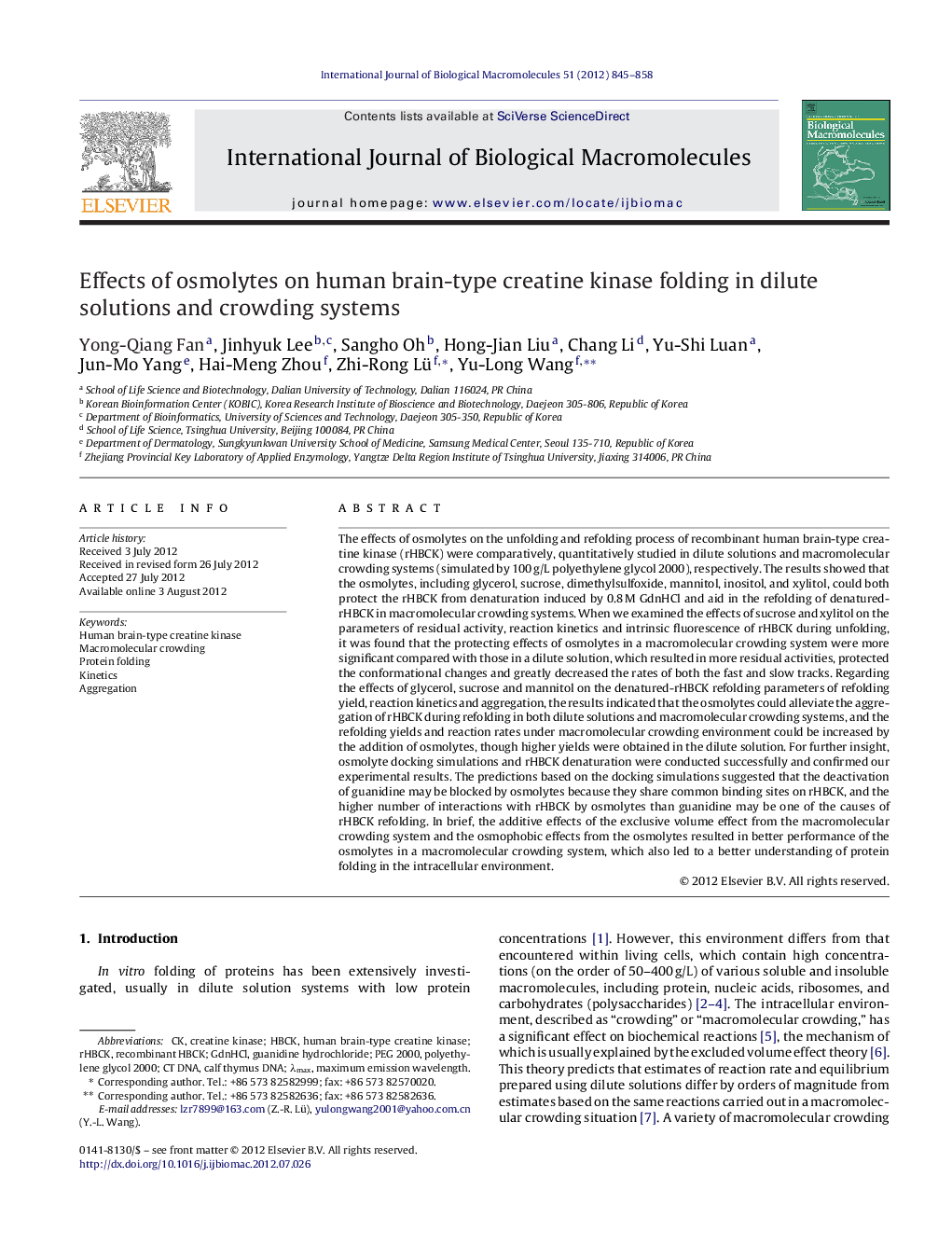| کد مقاله | کد نشریه | سال انتشار | مقاله انگلیسی | نسخه تمام متن |
|---|---|---|---|---|
| 8334139 | 1540269 | 2012 | 14 صفحه PDF | دانلود رایگان |
عنوان انگلیسی مقاله ISI
Effects of osmolytes on human brain-type creatine kinase folding in dilute solutions and crowding systems
دانلود مقاله + سفارش ترجمه
دانلود مقاله ISI انگلیسی
رایگان برای ایرانیان
کلمات کلیدی
موضوعات مرتبط
علوم زیستی و بیوفناوری
بیوشیمی، ژنتیک و زیست شناسی مولکولی
زیست شیمی
پیش نمایش صفحه اول مقاله

چکیده انگلیسی
The effects of osmolytes on the unfolding and refolding process of recombinant human brain-type creatine kinase (rHBCK) were comparatively, quantitatively studied in dilute solutions and macromolecular crowding systems (simulated by 100Â g/L polyethylene glycol 2000), respectively. The results showed that the osmolytes, including glycerol, sucrose, dimethylsulfoxide, mannitol, inositol, and xylitol, could both protect the rHBCK from denaturation induced by 0.8Â M GdnHCl and aid in the refolding of denatured-rHBCK in macromolecular crowding systems. When we examined the effects of sucrose and xylitol on the parameters of residual activity, reaction kinetics and intrinsic fluorescence of rHBCK during unfolding, it was found that the protecting effects of osmolytes in a macromolecular crowding system were more significant compared with those in a dilute solution, which resulted in more residual activities, protected the conformational changes and greatly decreased the rates of both the fast and slow tracks. Regarding the effects of glycerol, sucrose and mannitol on the denatured-rHBCK refolding parameters of refolding yield, reaction kinetics and aggregation, the results indicated that the osmolytes could alleviate the aggregation of rHBCK during refolding in both dilute solutions and macromolecular crowding systems, and the refolding yields and reaction rates under macromolecular crowding environment could be increased by the addition of osmolytes, though higher yields were obtained in the dilute solution. For further insight, osmolyte docking simulations and rHBCK denaturation were conducted successfully and confirmed our experimental results. The predictions based on the docking simulations suggested that the deactivation of guanidine may be blocked by osmolytes because they share common binding sites on rHBCK, and the higher number of interactions with rHBCK by osmolytes than guanidine may be one of the causes of rHBCK refolding. In brief, the additive effects of the exclusive volume effect from the macromolecular crowding system and the osmophobic effects from the osmolytes resulted in better performance of the osmolytes in a macromolecular crowding system, which also led to a better understanding of protein folding in the intracellular environment.
ناشر
Database: Elsevier - ScienceDirect (ساینس دایرکت)
Journal: International Journal of Biological Macromolecules - Volume 51, Issue 5, December 2012, Pages 845-858
Journal: International Journal of Biological Macromolecules - Volume 51, Issue 5, December 2012, Pages 845-858
نویسندگان
Yong-Qiang Fan, Jinhyuk Lee, Sangho Oh, Hong-Jian Liu, Chang Li, Yu-Shi Luan, Jun-Mo Yang, Hai-Meng Zhou, Zhi-Rong Lü, Yu-Long Wang,